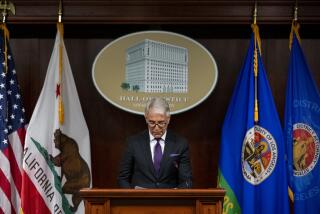Tripp Sues White House, Pentagon
- Share via
WASHINGTON — Linda Tripp, who ignited the scandal that nearly brought down President Clinton with her secretly recorded tapes, struck back at her enemies Monday by filing an invasion-of-privacy lawsuit against the White House and the Pentagon.
The lawsuit, filed in federal court, alleges that officials loyal to Clinton sought to embarrass and smear Tripp by “engaging in communications” about her and disclosing the contents of confidential “personnel files, FBI files, security files and other government records” of the former White House and current Defense Department employee.
Tripp is seeking unspecified damages against 11 past and present administration figures. Among them are First Lady Hillary Rodham Clinton, Deputy White House Counsel Bruce Lindsey and former Clinton aides Sidney Blumenthal, Harold Ickes and Mickey Kantor.
The complaint also names Pentagon public affairs chief Kenneth H. Bacon and his former aide, Clifford Bernath, who have acknowledged disclosing to the press that Tripp had failed to report in her security file a long-ago arrest in New York state. Tripp, 49, said that, “for partisan political purposes,” she was subjected to “harm to [her] reputation and emotional distress and humiliation.”
Tripp’s lawsuit provides still more evidence that the sordid White House sex-and-lying saga has yet to end. In July, she was indicted by a state grand jury in Maryland on two felony charges related to her secret taping of her telephone conversations with former White House intern Monica S. Lewinsky. Tripp, who said that her prosecution was inspired by the Clinton White House, has pleaded not guilty and continues to work at the Pentagon as a $90,000-a-year public affairs specialist. She occasionally phones in sick because of stress, according to associates.
White House spokesman Jim Kennedy declined to comment on Tripp’s lawsuit. Pentagon officials said that they would have no comment until a still-confidential inspector general’s report on the actions of Bacon and Bernath is made public.
Tripp, once a confidant of Lewinsky, secretly tape-recorded phone conversations in which she encouraged Lewinsky to discuss her affair with Clinton. Tripp then took the information to independent counsel Kenneth W. Starr.
Tripp later testified for four days before Starr’s federal grand jury.
Tripp’s lawsuit is vague about alleged actions by Mrs. Clinton and other current or former White House officials, except to say that they violated federal civil rights statutes and the Privacy Act of 1974 by engaging in conversations and disclosing confidential information designed to humiliate her and destroy her credibility as a witness in the Lewinsky investigation.
The complaint noted that Tripp’s file was among hundreds of security files of Republican appointees improperly obtained by the White House from the FBI at the start of the administration in 1993. The White House action was investigated by the Senate and Starr’s office for several months in a case dubbed “Filegate,” but no criminal wrongdoing was found.
Tripp, a holdover from the Bush administration, worked in the Clinton White House counsel’s office until August 1994, when she was transferred to the Pentagon. Tripp has said that she was moved from the White House unwillingly because she knew about a meeting in which former White House volunteer Kathleen Willey alleged that Clinton groped her.
Tripp’s lawsuit was assigned to U.S. District Judge Royce C. Lamberth, a Republican appointee who already is overseeing a two-year-old complaint filed on behalf of Tripp and others whose FBI files were examined by the White House.
That complaint was initiated by Judicial Watch, a conservative legal organization.
The Judicial Watch complaint notes--as does Tripp’s personal lawsuit--that Pentagon officials released potentially damaging information about her from her personnel security folder weeks after she had blown the whistle on the Clinton-Lewinsky relationship.
Responding to a request from a reporter for the New Yorker magazine, Defense officials disclosed that Tripp, in an apparent violation of reporting rules, had failed to tell her superiors about her arrest in Upstate New York in 1969 when she was a teenager.
The magazine promptly published the disclosure.
In a deposition to Judicial Watch lawyers, Bacon said that he regretted allowing the disclosure without determining if it constituted a violation of the federal Privacy Act. “I wish I had asked the question about the Privacy Act,” Bacon testified.
Tripp was arrested on suspicion of theft of $263 in cash and a $600 watch. She claimed the items were planted in her handbag by friends as part of a teenage prank. The case was resolved in a plea bargain when Tripp pleaded guilty to a lesser charge of loitering.
More to Read
Sign up for Essential California
The most important California stories and recommendations in your inbox every morning.
You may occasionally receive promotional content from the Los Angeles Times.













